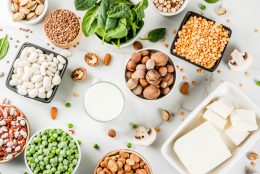
Nutritional interrogation is frequent among us vegans, but rare among the carnivores of the world. The constant questioning feels hostile, even if asked out of curiosity. Consistent onslaughts have driven me to develop an arsenal of responses, each highly dependent upon the carnivore’s knowledge. If they are fluent in biology, I will respond with, “I usually photosynthesize my macronutrients, or graze on some grass if it’s cloudy.” They should know protein is found in every organism. For others, the simple answer is that plant-based protein is abundant in beans, tofu, tempeh, seitan, nuts, seeds, grains and plant protein powders. Yes, all plants have protein. I wonder: Why do people care so much about where I get my protein? Do I ask meat-eaters where they get their Omega-3 fatty acids or Vitamin A or phytonutrients? The hypocrisy is outrageous; for example, I wouldn’t have any friends if I continually pestered others about their questionable eating habits. My last and most hostile response is, “I eat food. What do you pollute your body with?”
Is this question ever asked to an elephant or rhinoceros, who are both vegan animals? They synthesize their meaty tissues from plant material. Eating meat and dairy as sources of protein then seems like an inefficient method of obtaining energy as it is merely recycled plant material. Why get your protein from a middleman when you could obtain it directly from the source? In the book “Walden,” a farmer told Henry David Thoreau, “You cannot live on vegetable food solely, for it furnishes nothing to make bones with,” all while walking behind his oxen, which, “with vegetable-made bones, jerk him and his lumbering plow along in spite of every obstacle.”
In our culture, where we are told protein is king and milk is necessary for strong bones, we grow up drinking the Kool-aid of propaganda provided by the government and meat and dairy industries. The most similar parallel I can draw is the blind trust characters in “The Giver” bestow upon the government with their pill regiments and altered history.
Plant protein sources lack all of the undesirable consequences of meat and dairy protein sources, such as heart disease-causing cholesterol, cancer-causing heterocyclic amines and antibiotics, pesticides and hormones to keep the animals fat.
As an athlete, it was an easy decision to choose a plant-based diet. It’s a widely known fact in the sports world that this diet will decrease recovery time between workouts by reducing inflammation. Simply ask the many professional athletes who have found success with plant-based lifestyles, such as Venus Williams, Scott Jurek and Kendrick Farris. By not consuming the bacterial endotoxins found in animal products, our bodies do not produce an inflammatory response and our arteries do not stiffen.
The National Dairy Council recommends consuming more milk and dairy to prevent osteoporosis, yet dairy products show little to no benefit to bone health. Our country’s dairy consumption is the main source of saturated fat, contributing to heart disease, type 2 diabetes and Alzheimer’s. Dairy has also been linked to breast, ovarian and prostate cancers. Are you worried about not getting enough calcium? It can be found in leafy green vegetables, beans, fortified juices and plant milks, and is more easily absorbed than animal calcium.
Of course, we are never taught the pitfalls of the Western diet in high school or college. Instead, we are inundated with commercials of Olympic athletes drinking milk after workouts and countless fast food advertisements. I understand most people are misinformed about the field of nutrition, but do your homework before you attack a vegan with a question that may come across as ignorant.
Nicholas Walker is a junior majoring in biomedical engineering.


